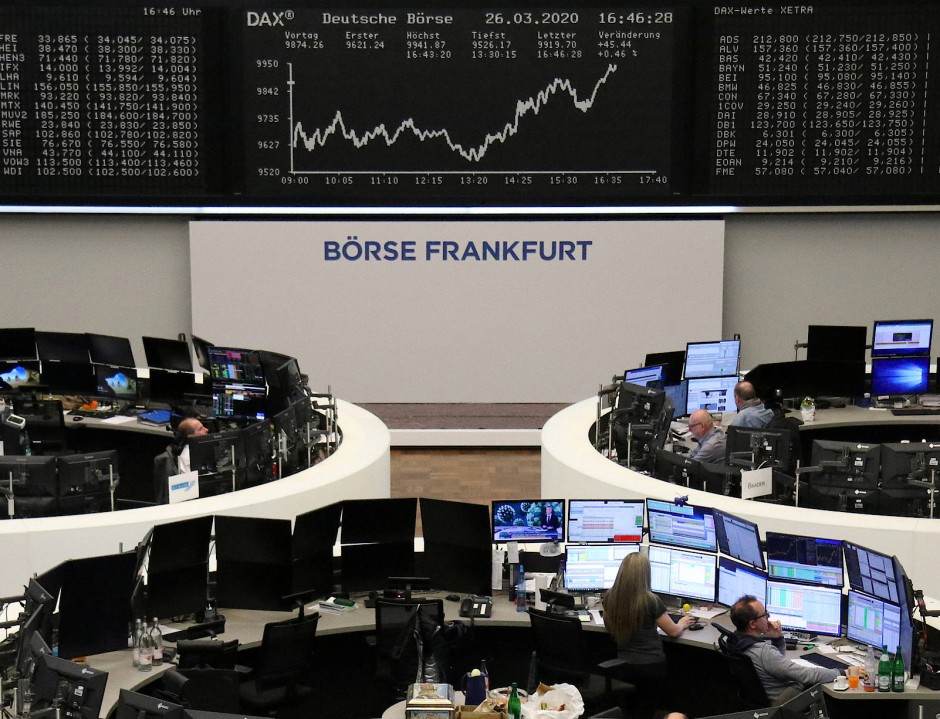Frankfurt DAX Closes Lower Than 24,000 Points

Table of Contents
Factors Contributing to the DAX Decline
Several interconnected factors contributed to the Frankfurt DAX's fall below 24,000 points. Understanding these elements is crucial for interpreting the current market situation and anticipating future trends.
Impact of Inflation and Interest Rate Hikes
Persistent inflation across Europe and the subsequent interest rate hikes by the European Central Bank (ECB) are significantly impacting economic growth and investor confidence. The ECB's aggressive monetary policy aims to curb inflation, but higher interest rates have a ripple effect throughout the economy.
- Reduced Investment: Higher borrowing costs make it more expensive for businesses to invest in expansion or new projects, slowing economic growth.
- Impact on Corporate Profits: Increased interest payments eat into corporate profits, potentially leading to decreased dividends and reduced stock valuations.
- Effect on Stock Prices: As future earnings prospects dim, investors often react by selling stocks, driving down prices, as seen with the recent DAX decline. This creates a negative feedback loop, further impacting investor sentiment and the DAX index.
Geopolitical Uncertainty and its Influence
Global geopolitical tensions, particularly the ongoing war in Ukraine and strained US-China relations, are contributing to investor risk aversion. This uncertainty makes investors hesitant to commit capital, leading to sell-offs in the stock market.
- Energy Crisis: The war in Ukraine has exacerbated the energy crisis in Europe, impacting German businesses significantly, increasing input costs, and hindering growth.
- Supply Chain Disruptions: Geopolitical instability continues to disrupt global supply chains, adding to inflationary pressures and impacting the profitability of numerous German companies.
- Investor Risk Aversion: The overall uncertain global environment encourages investors to move towards safer assets, reducing demand for riskier investments like stocks, contributing to the DAX's decline.
Weakening Euro and its Effect on Export-Oriented Companies
The weakening Euro against other major currencies, such as the US dollar, negatively impacts German exporters. A weaker Euro makes German goods more expensive for international buyers, potentially reducing export volumes and profitability.
- Automotive Sector: The automotive industry, a significant component of the DAX, is particularly vulnerable due to its reliance on global export markets.
- Manufacturing and Industrial Goods: Companies exporting manufactured goods and industrial products are also disproportionately affected by currency fluctuations.
- Reduced Profitability: A weaker Euro reduces the value of overseas earnings when converted back into Euros, ultimately decreasing profitability and impacting stock prices. This trend is observable in the recent performance of several key DAX players.
Analysis of Key DAX Performers
Analyzing the performance of individual sectors and companies within the DAX provides a deeper understanding of the market downturn.
Sector-Specific Performance
The recent DAX decline hasn't affected all sectors equally. While some sectors are holding relatively steady, others have been hit harder.
- Technology Sector: The technology sector often experiences greater volatility, and this was reflected in the recent DAX decline.
- Automotive Sector: As mentioned, the automotive sector's dependence on exports makes it particularly susceptible to economic downturns and currency fluctuations.
- Financial Sector: Banks and financial institutions are generally less impacted by supply-chain issues but are affected by interest rate changes and economic sentiment.
Investor Sentiment and Trading Volume
Analyzing investor sentiment and trading volume provides valuable insights into market dynamics. High trading volume often indicates significant market activity and the potential for further price movements.
- Negative Sentiment: Recent analyst reports reflect a prevailing negative sentiment, indicating a cautious outlook among investors.
- Increased Trading Volume: The increased trading volume accompanying the DAX fall below 24,000 points suggests significant market activity and a potential for further price fluctuations. This volatility underscores the need for careful monitoring and strategic decision-making.
Conclusion
The Frankfurt DAX's fall below 24,000 points is a consequence of interconnected factors, including persistent inflation, rising interest rates, geopolitical uncertainties, and a weakening Euro. The decline highlights the current volatility in the market and necessitates a cautious approach for investors. Different sectors within the DAX are exhibiting varied levels of resilience, demonstrating the nuanced impact of these economic pressures.
Stay updated on the Frankfurt DAX and its impact on the German and global economy. Monitor the DAX index closely for further market movements, and consider subscribing to receive future updates on the Frankfurt DAX index. Understanding these dynamic factors is crucial for making informed investment decisions in this challenging market environment.

Featured Posts
-
 Porsche Now Labubu
May 24, 2025
Porsche Now Labubu
May 24, 2025 -
 Dallas Chef Tiffany Derrys Master Chef Judging Return
May 24, 2025
Dallas Chef Tiffany Derrys Master Chef Judging Return
May 24, 2025 -
 Escape To The Country Top Locations For A Tranquil Getaway
May 24, 2025
Escape To The Country Top Locations For A Tranquil Getaway
May 24, 2025 -
 Roadworks M62 Westbound To Close For Resurfacing Manchester To Warrington
May 24, 2025
Roadworks M62 Westbound To Close For Resurfacing Manchester To Warrington
May 24, 2025 -
 Jonathan Groffs Broadway Just In Time Performance A Tony Awards Contender
May 24, 2025
Jonathan Groffs Broadway Just In Time Performance A Tony Awards Contender
May 24, 2025
